
-
Find the right food for your petTake this quiz to see which food may be the best for your furry friend.Find the right food for your petTake this quiz to see which food may be the best for your furry friend.Featured products
 Perfect Digestion Small & Mini Adult Dog Food
Perfect Digestion Small & Mini Adult Dog FoodHill's Science Plan Perfect Digestion Small & Mini Adult Dog Food with Turkey is a complete premium pet food for small breed adult dogs aged 1–6 years. This deliciously smooth mousse is precisely balanced to deliver the appropriate amount of energy and to support digestive health in adult, small breed dogs.
Shop Now Hypoallergenic Small & Mini Adult Dog Food
Hypoallergenic Small & Mini Adult Dog FoodHILL'S SCIENCE PLAN Hypoallergenic Small&Mini Adult dog food with Salmon is complete pet food for adult small dogs 1–6 years old. It's formulated for dogs with delicate skin and stomach, with limited high quality novel protein sources & no grain.
Shop Now Perfect Weight Small & Mini Adult Dog Food
Perfect Weight Small & Mini Adult Dog FoodHill's Science Plan Adult Small & Mini Dog Food with Turkey is a complete premium pet food for adult small dogs from 1 year old that are prone to weight gain or slightly overweight. This deliciously smooth mousse is formulated to deliver the appropriate amount of energy to support weight maintenance in adult dogs.
Shop NowFeatured products Sterilised Mature Adult Cat Food
Sterilised Mature Adult Cat FoodHill's Science Plan Sterilised Cat Mature Adult Cat Food with Chicken is specially formulated with ActivBiome+ Multi-Benefit Technology. It is a precisely balanced nutrition tailored to meet the needs of mature adult sterilised cats, ages 7+, and to promote graceful ageing.
Shop Now Oral Care Adult Cat Food
Oral Care Adult Cat FoodHill's Science Plan Oral Care Adult Cat Food with Chicken contains clinically proven kibble technology to reduce plaque & tartar build up.
Shop Now Urinary Health Adult Cat Food with Chicken
Urinary Health Adult Cat Food with ChickenHill's Science Plan Urinary Health Adult Cat Food with Chicken supports the health of the whole urinary system. Suitable for sterilised cats.
Shop Now -
Dog
- Dog Tips & Articles
-
Health Category
- Weight
- Food & Environmental Sensitivities
- Urinary
- Digestive
- Joint
- Kidney
-
Life Stage
- Puppy Nutrition
- Adult Nutrition
- Senior Nutrition
Cat- Cat Tips & Articles
-
Health Category
- Weight
- Skin & Food Sensitivities
- Urinary
- Digestive
- Kidney
-
Life Stage
- Kitten Nutrition
- Adult Nutrition
Featured articles Tips For Mixing Wet And Dry Pet Food
Tips For Mixing Wet And Dry Pet FoodDiscover tips for mixing wet and dry pet food to ensure balanced nutrition and variety for your pet. For comprehensive feeding advice, visit Hill's Pet UK.
Read More Virtual Vet Visits: What You Need to Know
Virtual Vet Visits: What You Need to KnowLearn the ins and outs of a televet appointment before you talk to a vet online.
Read More Develop your gut instinct | Hill's Pet
Develop your gut instinct | Hill's PetDigestive disorders can affect any part of the digestive system, from the stomach, small intestine and through to the large intestine.
Read More -
Joint care for dogs
Joint care for dogs
Does your dog have stiff joints?
“Stiff joints” is a general term for changes in the joint caused by normal or abnormal wear and tear. Stiffness is usually a sign of joint pain. Because your dog’s joint pain directly impacts their mobility and how well they’re able to get around, it can have a serious effect on your dog’s quality of life.
For dogs who have stiff joints, the cartilage (the tissue that “cushions” the joint between the bones) is worn away faster than it is replaced. For example, when the cartilage in a dog’s hip joint wears away, mobility decreases, while pain and disability progressively develop. Although stiff joints are not curable, it is possible to improve joint health in your dog and to help them manage their joint pain.
What causes stiff joints?
Age
As dogs get older, joint cartilage will progressively wear away. Although while it it is much more common in senior dogs, younger dogs can still suffer from stiff joints, too.
Breed
Certain breeds are more prone to developing joint problems. “At-risk” dog breeds include Labrador Retrievers, Golden Retrievers, German Shepherds and Rottweilers.
Excess weight
Excess weight puts excess stress on your dog’s joints and cartilage, and increases the risk of stiff joints.
Accidents or trauma
Trauma to cartilage may lead to stiff joints later in life, and adversely affect mobility.
Congenital or hereditary defects
Some breeds may have congenital or hereditary conditions that make them more prone to developing joint problems later in life.
What causes stiff joints?
Age
As dogs get older, joint cartilage will progressively wear away. Although while it it is much more common in senior dogs, younger dogs can still suffer from stiff joints, too.
Breed
Certain breeds are more prone to developing joint problems. “At-risk” dog breeds include Labrador Retrievers, Golden Retrievers, German Shepherds and Rottweilers.
Excess weight
Excess weight puts excess stress on your dog’s joints and cartilage, and increases the risk of stiff joints.
Accidents or trauma
Trauma to cartilage may lead to stiff joints later in life, and adversely affect mobility.
Congenital or hereditary defects
Some breeds may have congenital or hereditary conditions that make them more prone to developing joint problems later in life.

If you notice any of the following warning signs of joint discomfort in your dog, you should consult your veterinarian.





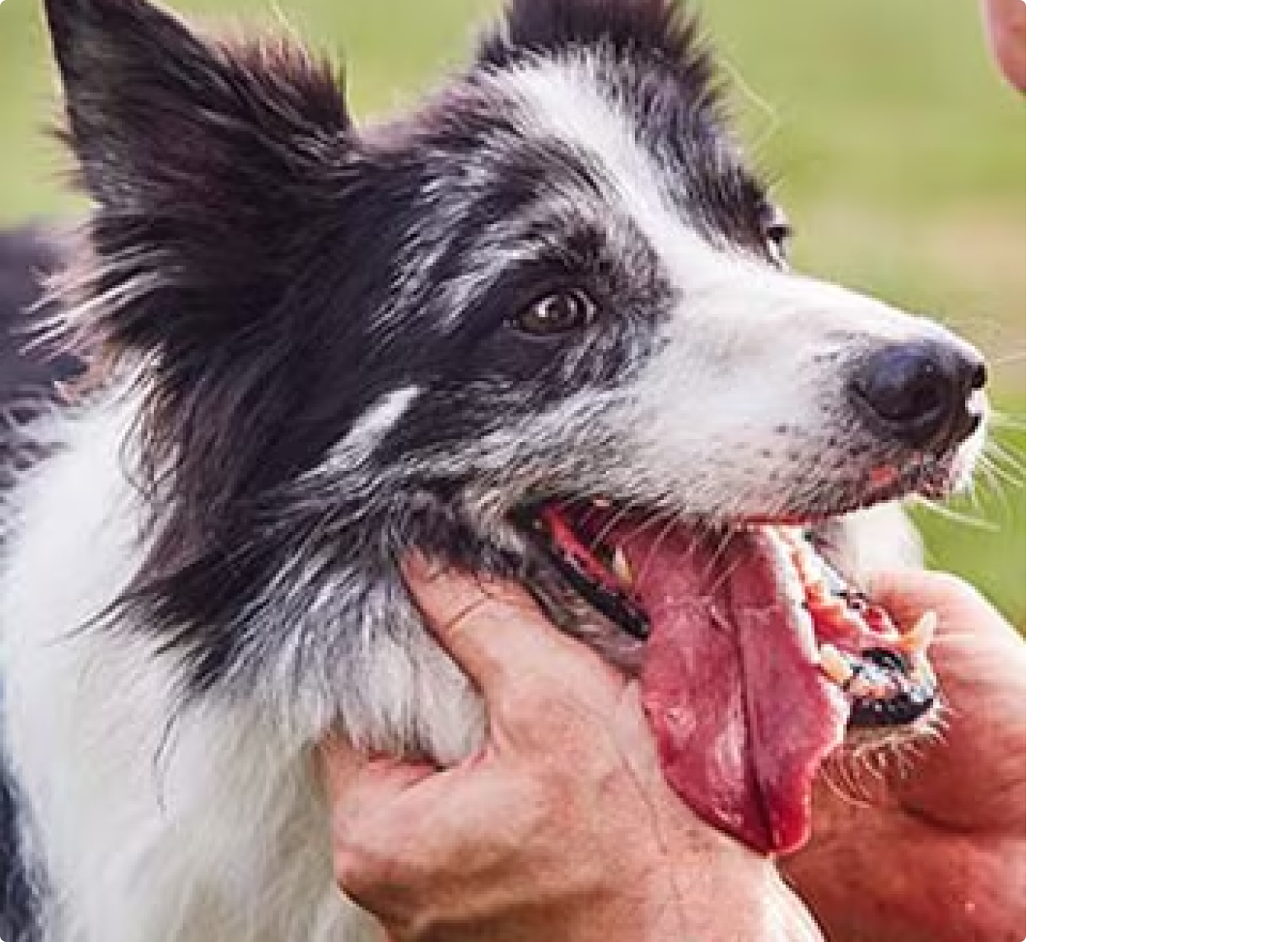
Joints and exercise
Gentle exercise is extremely good for your dog. Not only will it help keep their joints moving freely, but it will help them stay at a healthy weight and keep excess stress off their joints, which are important to their overall joint health.
The key is to control the amount of exercise, so your dog does not overexert their joints. Given an open space, your dog will usually happily run and run until they can’t any more and they may pay the price in terms of pain afterwards. By allowing a little bit of running and then putting them back on their lead for a while and taking a gentle stroll, you can control the exercise and let your dog get enough of a workout to burn off energy and keep joints mobile without causing damage.
If you’re worried about your dog getting more exercise than is beneficial, your veterinarian will be happy to advise you a sensible dog exercise regime.
Joints and exercise
Gentle exercise is extremely good for your dog. Not only will it help keep their joints moving freely, but it will help them stay at a healthy weight and keep excess stress off their joints, which are important to their overall joint health.
The key is to control the amount of exercise, so your dog does not overexert their joints. Given an open space, your dog will usually happily run and run until they can’t any more and they may pay the price in terms of pain afterwards. By allowing a little bit of running and then putting them back on their lead for a while and taking a gentle stroll, you can control the exercise and let your dog get enough of a workout to burn off energy and keep joints mobile without causing damage.
If you’re worried about your dog getting more exercise than is beneficial, your veterinarian will be happy to advise you a sensible dog exercise regime.
Switching nutrition may help
The food your dog eats can also influence their joint health and mobility. Balanced nutrition is essential part of an active, healthy lifestyle for dogs. If you’re concerned about your dog’s joint health, consult with your veterinarian and discuss the best food.
Switching nutrition may help
The food your dog eats can also influence their joint health and mobility. Balanced nutrition is essential part of an active, healthy lifestyle for dogs. If you’re concerned about your dog’s joint health, consult with your veterinarian and discuss the best food.
Related products
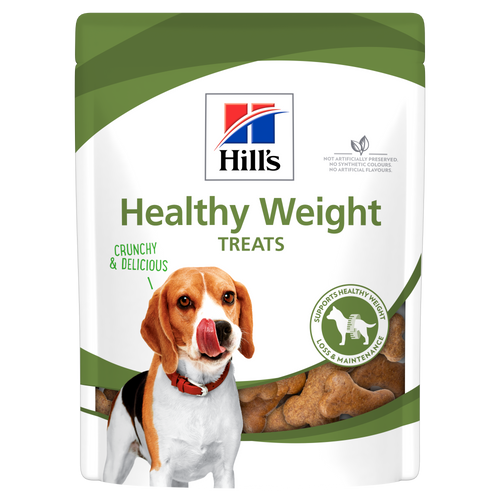
Hill's Healthy Weight Dog Treats - a tasty, complementary pet food formulated for adult dogs over the age of 1 to support healthy weight loss and maintenance.
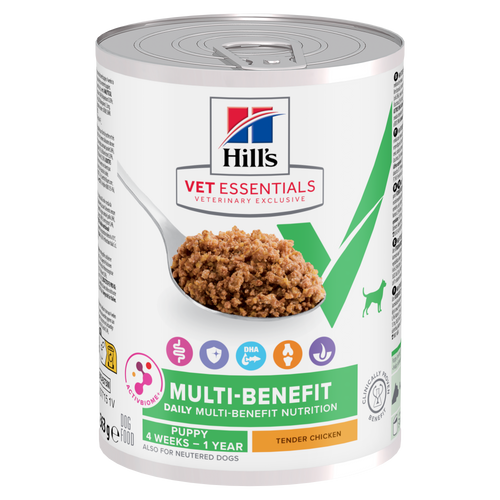
Hill's Vet Essentials Multi-Benefit Puppy wet dog food with tender Chicken (in a can for Small & Mini and Medium breed puppies up to 12 months old) is vet-exclusive, multi-benefit nutrition clinically proven to support your puppy's growth and developmental needs. For healthy digestion and well-being, our ActivBiome+ prebiotic blend nourishes their developing microbiome and is formulated with omega-3s to support brain development and antioxidants to support a developing immune system — for a better today, and many more tomorrows.
With nutritional benefits that are comparable to our dry food, wet foods can help increase your pet’s water intake and are a great way to satisfy your dog’s need for variety, with many ways to mix wet and dry foods.
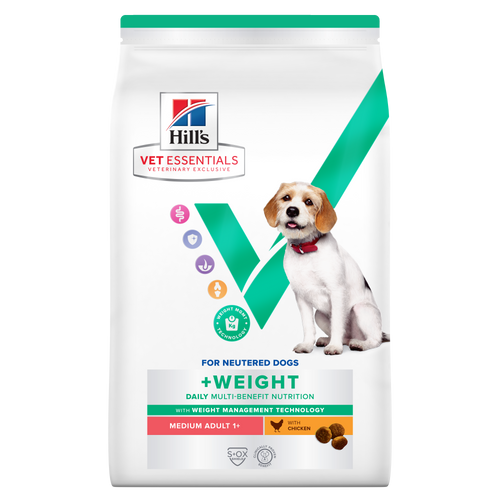
Chicken recipe dry dog food for medium breed dogs after neutering, helps support digestion and joint health. With unique weight-management technology to help reach & maintain optimal weight.
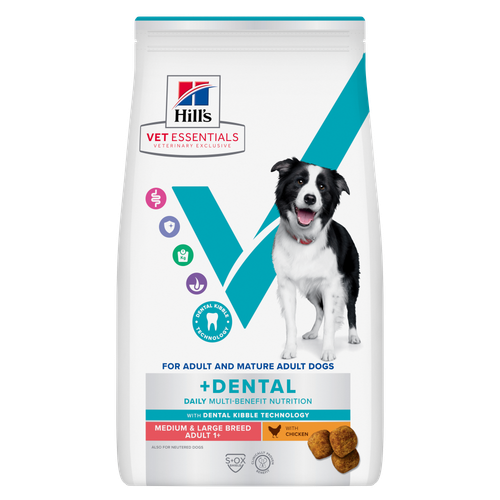
Chicken recipe dry dog food for medium breed dogs, with Dental Kibble Technology that helps reduce plaque & tartar buildup, and helps freshen breath and keep gums healthy as pets chew.
Related articles

Gurgling tummies in turmoil are not good news for pets. Owners who have to clean up the unfortunate consequences, digestive problems are one of the rare downsides to owning a pet.

It’s not uncommon for your dog to suffer from different types of digestive disorders. Acting quickly can prevent issues from worsening.
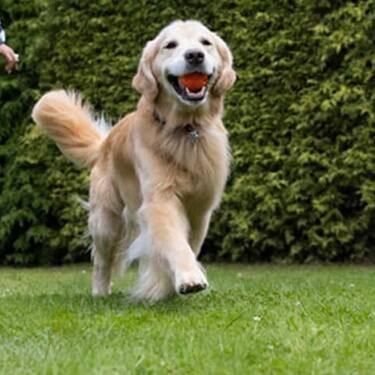
Understand the potential causes of excessive dog itching and how to address them. Seek relief for your dog with expert advice from Hill's Pet UK.

Dog obesity is a significant problem - learn more about helping your dog become trimmer and healthier through improved nutrition.

